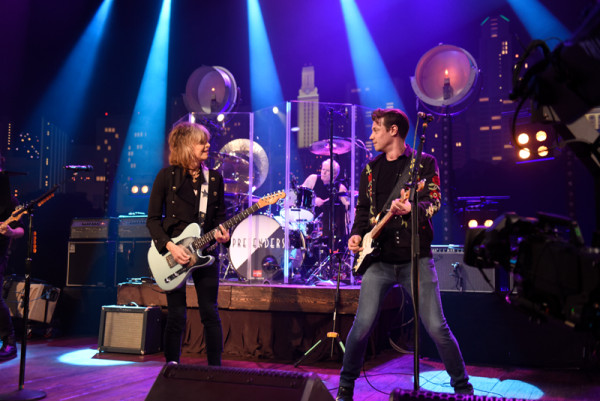For music fans, Herbie Hancock needs little introduction. The keyboardist and composer is not only a jazz legend, but also a funkateer, R&B balladeer and technology innovator in music. There are no walls separating the different sides of his musical personality, though – Hancock gleefully mashes all of his interests together into a cohesive whole. We couldn’t have been more thrilled to host him on our stage, and he used his debut Austin City Limits taping to prove exactly why he’s a musical icon.
Hitting the stage to a standing ovation, Hancock and his stellar three-piece band began the set with, appropriately enough, “Overture,” sampling the musical themes of the rest of the tunes just like a symphony orchestra does at a classical concert. Hancock drew a bucket of strange noises out of his synthesizer as jazz/session drummer supreme Vinnie Colaiuta, Saturday Night Live bassist James Genus and saxophonist/keyboardist/Kendrick Lamar producer Terrace Martin limbered up. Martin dropped in vocoder blurts in between wailing on his alto, while Colaiuta and Genus provided a masterclass of how to be laidback but look busy. Turning to his piano, Hancock moved from atmospheric ambience to furious storms of notes, never losing the melody no matter how far out he went.
After a mesmerizing stretch with each musician demonstrating their ingenuity, the overture came to a close and Hancock introduced the band. Then they went into “Actual Proof,” from Hancock’s classic 70s jazz/funk masterpiece Thrust. Hancock moved seamlessly from multiple synth sounds to the piano, going from funky to jazzy, rhythmic to melodic, and back again. Hancock may be 77, but his keyboard facility is as potent now as it was when he was 27. Martin then reeled out his sax, matching his bandleader lick for lick. Genus next took the spotlight with a short but hard grooving bass solo, before the song shifted back to the leader’s electronic keys.
Donning his vocoder, Hancock went into “Come Running to Me,” from 1978’s Sunlight, adding otherworldly vocals to what’s essentially a jazzy R&B ballad, showing the kids how it was done before the advent of Auto-Tune. Electronics may have seemed to dominate at first, but Hancock coaxed magic out of his grand piano once again. Martin also took up the mic through his own vocoder, providing spaced-out counterpoint to the leader’s robotic croon. Then Hancock and the band gave us a real treat: an unrecorded/unreleased song. “Secret Sauce” began with a thrusting groove on synth and bass guitar, before coming down to near-silence and slowly building itself back up again, at least partially due to Hancock’s wielding the synth and piano at the same time. Hancock turned the spotlight over to Martin, who duetted with himself on synthesizer and vocoder, joining Colaiuta and Genus crashing back in with a sax attack. Hancock went mobile, wielding his keytar (an instrument we’ve not seen on our stage since Edgar Winter in the eighties) for some fleet-fingered soloing.
Hancock and ensemble closed the main set with “Cantaloupe Island.” Though probably most famous as the basis for the US3 hit “Cantaloop (Flip Fantasia),” the song is one of the composer’s signature tracks, recorded twice: one in 1964 on his postbop classic Empyrean Isles and again in 1976 on his funk/jazz landmark Secrets. This version looked back to the original, not only in its signature piano riff, but in the jaw-dropping soloing from Hancock’s piano and Martin’s alto. It was the pinnacle of the main set, and the crowd responded accordingly with wild applause as the band left the stage. The exit was brief, however, as just offstage Hancock donned his keytar for the signature riff of his iconic jazz/funk tune “Chameleon.” Retaking the stage, Hancock faced off with the sax-wielding Martin as Genus and Colaiuta brought the groove to a boil. The bandleader then took centerstage for an extended synth solo that no doubt fired up every air keyboardist in the joint. Keytar in hand, Hancock brought the show to a close with a flourish.
Few artists in any genre can achieve such a masterful balance of the challenging and the crowdpleasing. The audience went unsurprisingly crazy, as well they should for a giant who not only lives up to, but surpasses his sterling reputation. It was a magnificent show, and we can’t wait for you to see it when it airs early next year on your local PBS station.

